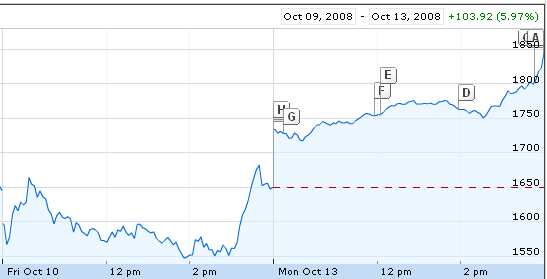Bankers of the world unite, you have nothing to lose but your bad investments. Well, at this late hour it looks like some odd plan is coming together that makes Uncle Sam a shareholder in some of America’s biggest and most secure banks.
U.S. Said to Invest in Citigroup, Goldman, Bank of America
Oct. 13 (Bloomberg) — The Bush administration will announce a plan to rescue frozen credit markets that includes spending about half of a total of $250 billion for stakes in nine major banks, according to people briefed on the matter.
The banks are Citigroup Inc., Wells Fargo & Co., JPMorgan Chase & Co., Bank of America Corp., Goldman Sachs Group Inc., Morgan Stanley, State Street Corp., and Bank of New York Mellon Corp., said the people. One of the people also said Merrill Lynch & Co. will receive an investment.
This is perverse not only because we’re now edging towards communism, but because the government is having to bail out what have been perceived as some of the smartest, best run and least debilitated financial institutions — Wells Fargo, JPM, Goldman. Like the decision to make an unlimited guarantee money market funds a few weeks back — which had the perverse consequence of nearly provoking a flight out of regular bank accounts with FDIC limits up to only $100k — this makes all other financial instituations look bad in comparison and further destabilizes the banking system. Sure the Brits have done something similar, but they have far fewer banks.
No doubt there’ll be a new tournequet applied to this gangrenous band-aid by tomorrow evening, but for now, this looks silly and dangerous.
For businesses, the question remains — can I get a loan to pay my staff or expand my business? — or will banks simply hoard cash as Japanese banks did throughout the 90s?
And the answer, until the Fed and Treasury start simply mailing everyone blank checks, is no loans unless you’re a government-owned bank.
But the day of free money for all grows closer. this suggests we should all be hoarding shotgun shells, seed corn, water purification tablets, jerry cans of gasoline, cartons of cigarettes, boxes of antibiotics… any goods that are more actually usable (and therefore tradeable) versus the previously useful fiction of currency or credit.
Update:Well, I went back to the same article and there are some new disturbing details (see my bold face.)
U.S. Treasury Said to Invest in Nine Major U.S. Banks (Update1)
By Robert Schmidt and Peter Cook
Oct. 13 (Bloomberg) — The Bush administration will announce a plan to rescue frozen credit markets that includes spending about half of a total of $250 billion for stakes in nine major banks, according to people briefed on the matter.
The companies are Citigroup Inc., Wells Fargo & Co., JPMorgan Chase & Co., Bank of America Corp., Goldman Sachs Group Inc., Morgan Stanley, State Street Corp., and Bank of New York Mellon Corp., the people said. One of the people also said Merrill Lynch & Co. will receive an investment.
The injections represent a new approach for Treasury Secretary Henry Paulson’s attempts to prevent a financial market meltdown from sending the U.S. economy into a prolonged recession. He’s following similar interventions by European leaders and using broad powers Congress gave him earlier this month to save the country’s banking system.
“They’ve decided they need to do something drastic and this is drastic,” said Gerard Cassidy, a bank analyst at RBC Capital Markets in Portland, Maine.
None of banks getting government money was given a choice about it, said one of the people familiar with the plans. All of the banks involved will have to submit to compensation restrictions, said the person.
The government will also guarantee the banks’ newly issued senior unsecured debt, making it easier for them to refinance their liabilities, the person said.
Allocating Money
The Treasury plans to spend $25 billion each for stakes in Citigroup and JPMorgan, people said. Another $25 billion will be divided between Bank of America and Merrill, which agreed last month to be acquired by Bank of America. Goldman and Morgan Stanley will each get $10 billion, while State Street and Bank of New York will get injections of about $3 billion each, people said.
Financial institutions are struggling to regain the confidence of investors, counterparties and clients after bad loans caused more than $635 billion of writedowns across the industry. Falling share prices have made it harder to raise equity while surging borrowing costs have made debt refinancing harder.
Paulson, Federal Reserve Chairman Ben S. Bernanke and FDIC Chairman Sheila Bair scheduled at 8:30 a.m. press conference tomorrow in Washington. Paulson’s initiative follows an announcement in Europe that France, Germany, Spain, the Netherlands and Austria committed $1.8 trillion to guarantee bank loans and take stakes in lenders.
The press conference at Treasury will address “a series of comprehensive actions to strengthen public confidence in our financial institutions and restore functioning of our credit markets,” the department said in a e-mailed statement.
Chief executive officers of major U.S. banks met with Paulson to discuss the options for helping markets. Stocks in the U.S. earlier today rallied the most in seven decades, pushing the Standard & Poor’s 500 Index up 11.6 percent.
One other unintended consequence of this top-down approach — restricting salaries will mean all the smart folks flee banking.
Let’s not forget what started this mess… housing. Bad loans to improvident people repackaged into silly instruments sold to greedy bankers playing with other people’s money. (Now your money.) Here’s a fun blog that details how far out of whack the housing market is even as it “adjusts.” (Thank you Jesse.)


